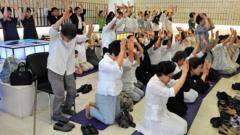The Unification Church, founded in South Korea, has been part of Japan's religious landscape since the 1960s. The recent court investigations uncovered troubling practices, such as coercing members to make sizable donations while exploiting their fears regarding spiritual welfare. Reports indicate that around 200 former members are currently seeking a total of 5.7 billion yen ($38.5 million) in compensation for alleged coercive donation practices.
The church's history of controversy has intensified since Abe's assassination, revealing deep connections between the sect and members of the ruling Liberal Democratic Party (LDP). An internal LDP review disclosed that nearly half of its lawmakers had associations with the church, sparking debates on the influence of religious organizations in politics. The court's ruling marks a pivotal moment in Japan's ongoing conversation about the intersection of religion and governance.
The church's history of controversy has intensified since Abe's assassination, revealing deep connections between the sect and members of the ruling Liberal Democratic Party (LDP). An internal LDP review disclosed that nearly half of its lawmakers had associations with the church, sparking debates on the influence of religious organizations in politics. The court's ruling marks a pivotal moment in Japan's ongoing conversation about the intersection of religion and governance.





















